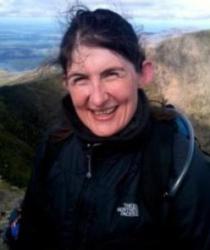
It was always a reasonable bet that Valerie St. Pierre would somehow follow a career connected with books. “I started reading at some horribly precocious age,” she admits, “and when I got to Bedales, I found precisely the type of creative and independent atmosphere that allowed my love of reading to flourish. My love of sci-fi and fantasy meant that I was known as the ‘Dragon Girl’; it wasn’t a cool thing to be caught reading as a teenager back then. But taking the teasing was a great learning lesson (one of many at Bedales) about deciding what was important to you and standing by your convictions. That was definitely a Bedalian theme - following your own passions. I found the entire English department at Bedales to be marvellous, and I always had plenty to say during lessons, but I do remember being told that while I had interesting points to make, it would be nice if I wasn’t so argumentative!”
Before finally deciding on her professional direction, Valerie, the daughter of a French-Canadian father and a self-confessed “mid-Atlantic girl”, travelled extensively through Canada and Europe in the hope of brushing up her language skills. Ultimately, there was no escaping the need to choose a career for herself. “The only job I’d ever had that you might call a ‘McDonald’s job’ was in a bookshop, books were still my great love, so publishing seemed a likely option,” Valerie explains.
Beginning as a rights manager at A&C Black, and graduating to positions as senior foreign rights manager at Octopus Publishing and her current role atQuarto, Valerie has now been in the publishing industry for some 14 years. Perhaps surprisingly for someone whose first love remains the science fiction/fantasy genre, her experience to date has come almost exclusively on the non-fiction side. “There is such a dividing line between them within publishing,” she sighs. “Making the crossover from one to another is so difficult because of the difference between them. Illustrated non-fiction has become my major field of expertise; it’s visual and a little more objective than fiction, where personal preference makes all the difference. Part of the attraction of coming to Quarto was the strength of the children’s section here – it’s arguably easier to use that as a springboard from which to cross over to fiction.”
From time to time, Valerie has retreated to America, where her mother’s family live, in order to work on her own first novel. “The first time, about three years ago, I had written eight chapters of what was meant to be a science fiction novel when I realised that I was boring myself,” she laughs. “I had a lot to learn about the whole process. Last year, I went back to the States and I’m now about two-thirds of the way through a novel aimed at young adults, so we’ll see how that goes.” Although she acknowledges her enjoyment of the works of Isaac Asimov, Arthur C. Clarke and David Weber, Valerie really comes alive when mentioning the influence of female science fiction/fantasy writers such as Lois McMaster Bujold, Robin McKinley, Anne McCaffrey and Ursula le Guin. “There have always been plenty of women involved in this area of fiction; they just make less noise about it,” she insists. “That speculative, theoretical sci-fi that leaves me cold is often written by men – boy fiction, I call it.”
In 2010, after being made redundant from Octopus Publishing, Valerie decided to make good use of her severance package. “I’d wanted to take some time off anyway, and I didn’t want to sit around doing nothing, so I thought to myself that I’d never been to Africa, never raised money for charity and never climbed a mountain, so why not climb Kilimanjaro?” Valerie says. “It was an extraordinary experience, easily the hardest thing I’ve ever done, much harder than getting a black belt in karate, which took me nine years, and I managed to raise plenty of money for charity as well, so it was well worth it.”
As she looks ahead to the future of her industry, Valerie is sanguine about the challenge of technology, such as electronic books, that publishing faces. “Although illustrated non-fiction probably has a bit more staying power than most, there’s no doubt that we will all go down the technological route in the end,” she predicts. “More and more publishing houses will essentially become content providers and editors, and the industry will split into those who are making beautiful objects and the rest of us, who will be creating well designed and edited stuff for electronic platforms.”
For her own career, Valerie has plenty of ambitions left. “First, I really want to get my novel finished at last,” she says. “As for publishing, I still love what we make and provide, and I love the fact that the industry still attracts such quirky and talented people. I’d like to think that life will be a mixture of writing and publishing from now on – that would be ideal.”
Valerie St. Pierre was interviewed by James Fairweather in Summer 2012.

